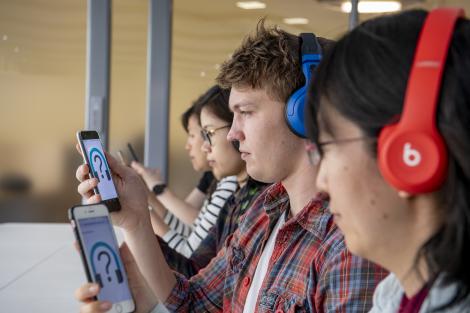Publications
Wu, Yihong, Heng, Yuwen, Niranjan, Mahesan and Kim, Hansung (2021) Depth estimation from a single omnidirectional image using domain adaptation. 18th ACM SIGGRAPH European Conference on Visual Media Production, CVMP 2021, , Virtual, Online, United Kingdom. 06 - 07 Dec 2021. 9 pp . (doi:10.1145/3485441.3485649).
Heng, Yuwen, Wu, Yihong, Dasmahapatra, Srinandan and Kim, Hansung (2022) CAM-SegNet: A context-aware dense material segmentation network for sparsely labelled datasets. International Conference on Computer Vision Theory and Applications, Online. 06 - 08 Feb 2022. (doi:10.5220/0010853200003124).

Our solution
People can get 24-hour access to online advice and support for a range of health interventions thanks to the world-leading LifeGuide software developed by researchers at Southampton.
Publications
Holland, Emilia, Stannard, Sebastian, Alwan, Nisreen, Boniface, Michael, Hoyle, Rebecca, Zlatev, Zlatko, Crozier, Sarah, Ahmed, Mazen, Mcmahon, James, Ware, William and Fraser, Simon (2021) Exploring sentinel conditions and the accrual sequence of multiple long-term condition multimorbidity (MLTC-M): an exploratory retrospective cohort study using birth cohort and routine primary care data. In The Lancet. The Lancet.. (In Press)
PhD
Dr Mohammad Naiseh is a Research Fellow in Trustworthy Autonomous Systems at the University of Southampton within the Faculty of Engineering and Physical Sciences.
Dr Naiseh works in the Trustworthy Autonomous Systems Hub (TAS-Hub), supporting and leading work packages in two agile projects: 'Inclusive Autonomous Vehicles', and 'Trustworthy Human-Swarm Partnerships'. Dr Naiseh is interested in how humans engage with autonomous systems and has worked on developing an engineering methodology for helping Explainable AI (XAI) designers to build interfaces with calibrated trust goal in mind.
Dr Naiseh is a mixed-methods researcher. He designs experiments and conducts qualitative user research to guide the design of Human-Centred AI. Dr Naiseh is passionate about bridging emerging XAI techniques and user-centered design. Also, Dr Naiseh has a keen interest in studying user trust, which he defines as a crucial requirement of deploying AI-based solutions in real-world problems as it has dynamic nature (over-trust and under-trust). He focuses on the principles, methods and tools needed to engineer trust-aware technology to calibrate trust in such technologies. His current research trajectory is exploring how we can improve public understanding of underlying ML algorithms through explainablity, transparency, education and user-centred design.
Dr Naiseh received his PhD from the Department of Computing and Informatics group at Bournemouth University. The PhD titled "A Design Method for Explainable AI Interfaces to enhance trust calibration" to guide designers and developers in enhancing trust calibration through XAI interface design.
Research
Research interests
- Human-AI teaming
- Explainable AI
Publications
Naiseh, Mohammad, Clark, Jediah, Divband Soorati, Mohammad and Bossens, David , (2021) Trusting machines? Cross-sector lessons from healthcare & security: conference report Southampton. University of Southampton 20pp. (doi:10.5258/SOTON/P0134).
Naiseh, Mohammad, Cemiloglu, Deniz, Al-Thani, Dena, Jiang, Nan and Ali, Raian (2021) Explainable Recommendations and Calibrated Trust: Two Systematic User Errors. Computer. (In Press)
Naiseh, Mohammad, Al-Thani, Dena, Jiang, Nan and Ali, Raian (2021) Explainable recommendation; when design meets trust calibration. World Wide Web, 24 (5), 1857-1884. (doi:10.1007/s11280-021-00916-0).
Cemiloglu, Deniz, Naiseh, Mohammad, Catania, Maris, Oinas-Kukkonen, Harri and Ali, Raian (2021) The Fine Line Between Persuasion and Digital Addiction. Ali, Raian, Lugrin, Birgit and Charles, Fred (eds.) In Persuasive Technology: PERSUASIVE 2021. vol. 12684, Springer. pp. 289-307 . (doi:10.1007/978-3-030-79460-6_23).
Naiseh, Mohammad, Jiang, Nan, Ma, Jianbing and Ali, Raian (2020) Explainable Recommendations in Intelligent Systems: Delivery Methods, Modalities and Risks. Dalpiaz, Fabiano, Zdravkovic, Jelena and Loucopoulos, Pericles (eds.) In Research Challenges in Information Science. RCIS 2020. vol. 385 LNBIP, Springer. pp. 212-228 . (doi:10.1007/978-3-030-50316-1_13).
Naiseh, Mohammad (2020) Explainability Design Patterns in Clinical Decision Support Systems. Dalpiaz, Fabiano, Zdravkovic, Jelena and Loucopoulos, Pericles (eds.) In Research Challenges in Information Science. RCIS 2020. vol. 385 LNBIP, Springer. pp. 613-620 . (doi:10.1007/978-3-030-50316-1_45).
Aldhayan, Manal, Naiseh, Mohammad, McAlaney, John and Ali, Raian (2020) Online Peer Support Groups for Behavior Change: Moderation Requirements. Dalpiaz, Fabiano, Zdravkovic, Jelena and Loucopoulos, Pericles (eds.) In Research Challenges in Information Science. RCIS 2020. vol. 385 LNBIP, Springer. pp. 157-173 . (doi:10.1007/978-3-030-50316-1_10).
Naiseh, Mohammad, Jiang, Nan, Ma, Jianbing and Ali, Raian (2020) Personalising explainable recommendations: Literature and conceptualisation. Rocha, lvaro, Adeli, Hojjat, Reis, Lus Paulo, Costanzo, Sandra, Orovic, Irena and Moreira, Fernando (eds.) In Trends and Innovations in Information Systems and Technologies. WorldCIST 2020. vol. 1160, Springer. pp. 518-533 . (doi:10.1007/978-3-030-45691-7_49).
Naiseh, Mohammad, Ramchurn, Sarvapali and Bentley, Caitlin (2022) Trustworthy Autonomous Systems (TAS): engaging TAS experts in curriculum design. 2022 IEEE Global Engineering Education Conference (EDUCON). 28 - 31 Mar 2022. 6 pp . (doi:10.1109/EDUCON52537.2022.9766663).
Contact
Telephone: +44 (0) 23 8059 447846109666
Email: m.naiseh@soton.ac.uk
Mechanical Workshop Technician
Contact
Telephone: +44 (0) 23 8059 3365
Email: pak1y21@soton.ac.uk